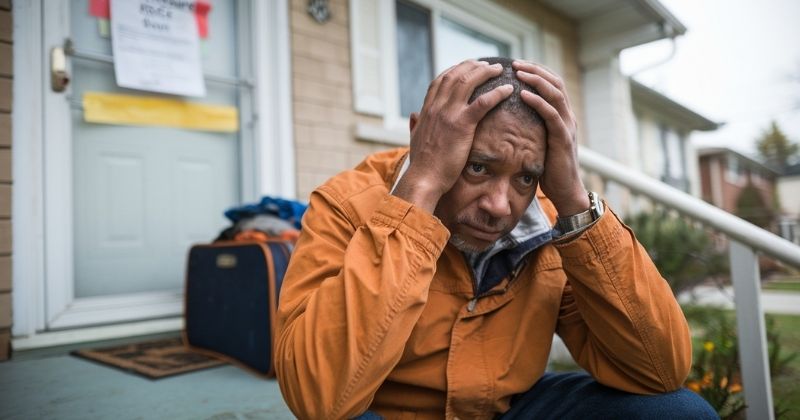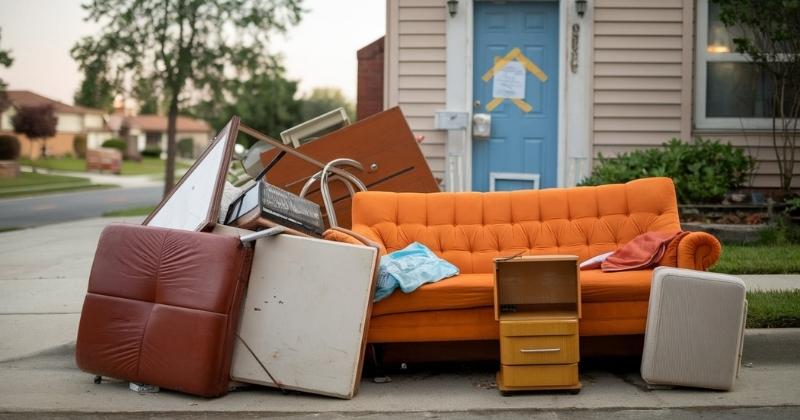
South African banks possess extensive powers that enable them to protect their financial interests, but these measures can sometimes have serious and unforeseen consequences for homeowners. While these financial institutions claim to act in the best interests of all parties involved, their actions often leave struggling homeowners feeling powerless, blindsided, and even betrayed by the very system meant to support them.
Key Takeaways
- Banks Can Take Over Homes Without Direct Homeowner Approval: South African banks have the authority to install caretakers in properties they deem abandoned, even if homeowners intend to return. This can result in homeowners being locked out without prior warning.
- Legal Protections Are Weak, Leaving Homeowners Vulnerable: While banks are required to issue a Section 129 notice before legal action, they are not obligated to confirm whether the homeowner actually receives it. This loophole means many homeowners only realise they’re in trouble when it’s too late.
- Financial Pressures Are Increasing the Risk of Home Loss: Rising mortgage arrears and financial difficulties are forcing more South Africans to sell their homes or face repossession. Without proactive communication with banks or debt counsellors, struggling homeowners risk losing their properties under legal but questionable practices.
One such power allows banks to appoint a caretaker to move into a property they believe to be abandoned. This means that, without direct communication with the homeowner, a third party can gain legal access to the property, changing locks, occupying the space, and taking control. While this is intended to safeguard the property—a shared asset between the bank and the homeowner—the practice raises concerns about transparency, homeowners’ rights, and the potential impact on already struggling individuals. Many South Africans, already battling a cost-of-living crisis, now face an even more chilling reality: the risk of losing their homes without notice.
About Arcadia Finance
Get the loan you need—fast and hassle-free—with Arcadia Finance. With zero application fees and access to 19 trusted lenders, all regulated by South Africa’s National Credit Regulator, you’re guaranteed a secure and transparent borrowing experience.
Homeowner’s Experience Sheds Light on Controversial Bank Practices
This issue recently surfaced during a discussion on The Money Show, where consumer journalist Wendy Knowler highlighted the case of a homeowner in Weltevreden Park, Roodepoort, who found herself locked out of her own house due to this banking policy. What should have been a temporary financial setback turned into a nightmare scenario—one that could happen to anyone behind on their bond repayments.
The homeowner, who had fallen behind on her bond repayments, was temporarily staying with family nearby after her electricity supply was cut off. Despite her financial struggles, she ensured that the property remained secure, checking in on it regularly along with her siblings. She had every reason to believe that her home was safe, never imagining that a third party could move in without her knowledge.
However, an extended period away during the December holidays turned into an unexpected nightmare. What was meant to be a relaxing break quickly spiralled into panic and disbelief.
“The longest I was away from the house was between the 20th and 30th of December, as I was on holiday with my family in Durban,” she explained.
Upon her return, she was shocked to find that a company had used a locksmith to gain access to the home and had effectively taken control of the property. The company claimed it had been instructed by Nedbank, her mortgage lender, to “guard” the house as a precautionary measure. But ‘guarding’ the house didn’t just mean protecting it from intruders—it meant locking out the rightful owner.
Learn more about What Happens if You Can’t Pay Your Debt in South Africa and discover the legal consequences, possible solutions, and steps you can take to protect your financial future before it’s too late.

The Legal Loopholes That Leave Homeowners Vulnerable
Knowler used this case to highlight a much broader issue—the legal processes banks follow when dealing with defaulting homeowners and the lack of adequate safeguards for those affected. The financial sector, despite its claims of responsible lending, continues to operate in a way that favours institutions over individuals.
Under South African law, banks are required to issue a Section 129 notice before taking legal action against a borrower in default. This notice serves as a formal letter of demand, warning the homeowner of possible legal consequences if the outstanding debt is not settled.
But what happens if the homeowner never receives it? What happens if the notice is lost in a pile of unopened mail or sent to an outdated address? The system, rather than protecting homeowners, often works against them.
However, Knowler pointed out that the burden of proof for issuing these notices is alarmingly low. Banks are only required to send the notice via registered mail to the address provided by the homeowner. They are not legally obligated to confirm whether the notice was actually received. In other words, banks can fulfil their legal duties on paper while leaving homeowners completely in the dark.
This creates a situation where many homeowners may be completely unaware that legal proceedings have been initiated against them. In such cases, default judgments can be granted in their absence, stripping them of any opportunity to dispute or negotiate the matter. By the time they realise what has happened, it’s often too late—the bank has already seized control.
As housing security becomes a growing concern, tenants are under financial pressure like never before. Tough Times Ahead for South African Renters dives into how the rental market is being squeezed, offering insights that complement the risks homeowners face.

The Economic Crisis Pushing More Homeowners Into Financial Distress
This case is just one example of the challenges faced by South African homeowners, many of whom are struggling to keep up with their mortgage payments amid rising economic pressures. With inflation biting, interest rates rising, and salaries failing to keep pace, homeownership is becoming a financial minefield.
Recent financial data reveals a worrying trend:
- First National Bank (FNB) reported that 23% of homeowners who sold their properties in the third quarter of 2024 did so because of financial difficulties. This figure has increased from 21% in the previous quarter and is significantly above the long-term average of 18%. That means nearly a quarter of all sellers weren’t moving by choice—they were forced to offload their properties just to stay afloat.
- Mortgage arrears have also seen a sharp rise, with 7.8% of South African mortgage debtors behind on payments by mid-2024. This is well above the historical average of 4.5% to 5%, indicating a growing number of homeowners facing the risk of foreclosure. Every statistic represents a real person, a real family, and a real home at risk.
While banks often deploy caretakers to prevent vandalism or structural deterioration of abandoned properties, the reality is that homeowners who are still actively trying to manage their financial obligations can be caught in this process as well. A missed payment or two can set off a chain reaction, with no guarantees that struggling homeowners will be given the chance to recover before drastic action is taken.
Many homeowners assume their property is secure, but financial and legal loopholes can sometimes lead to unexpected consequences. If you’re struggling with payments or facing disputes, your lender might take drastic action. Protecting your home with the right policy is crucial. Discover how to safeguard your property by reviewing Revise Your Home Insurance: A Comprehensive Checklist to ensure you’re fully covered against unexpected claims and financial threats.
What Homeowners Can Do to Protect Themselves
Struggling homeowners are strongly advised to maintain open communication with their bank to avoid situations where their property could be classified as abandoned. Keeping contact details updated and regularly checking for any correspondence from the bank is critical. A single missed call or ignored letter could be the difference between staying in your home and losing it.
Additionally, homeowners facing financial difficulty should be proactive in seeking help:
- Consulting a debt counsellor can provide legal and financial advice on managing arrears. This can be the lifeline that stops the situation from spiralling out of control.
- Renegotiating repayment terms with the bank may offer a temporary solution to avoid further action. Some banks are willing to restructure payments, but only if homeowners reach out before the situation worsens.
- Understanding legal rights and available recourse can prevent unnecessary property seizures or forced sales. Many homeowners simply don’t know what their options are until it’s too late.
As financial pressures continue to mount, homeowners must remain vigilant about their mortgage obligations and ensure they are not unknowingly placed at risk of losing access to their homes. Banks may hold the power, but knowledge is the only real defence homeowners have in this high-stakes game.
When you miss multiple mortgage payments, your debt doesn’t just disappear—it enters the hands of collection agencies and legal teams. The process can be overwhelming, but knowing what to expect can help you navigate the challenges ahead. Read this comprehensive guide on understanding the debt collection process in South Africa so you’re prepared for every step.
Conclusion
The growing financial strain on South African homeowners, combined with the broad powers banks wield, is creating a housing crisis where people can lose their homes without fair warning. While banks justify their actions as necessary to protect assets, the reality is that many homeowners are being left defenceless against a system that favours institutions over individuals. Staying informed, maintaining communication with lenders, and understanding legal rights are crucial steps in preventing sudden eviction or repossession. In a time of economic hardship, knowledge and proactive action remain homeowners’ best defences against an unforgiving financial system.
Fast, uncomplicated, and trustworthy loan comparisons
At Arcadia Finance, you can compare loan offers from multiple lenders with no obligation and free of charge. Get a clear overview of your options and choose the best deal for you.
Fill out our form today to easily compare interest rates from 19 banks and find the right loan for you.


